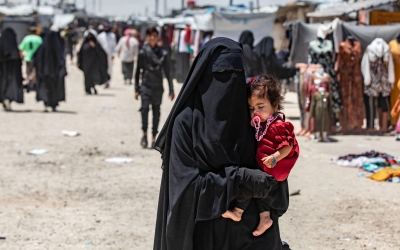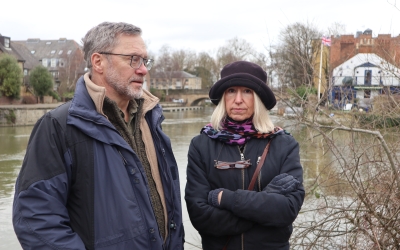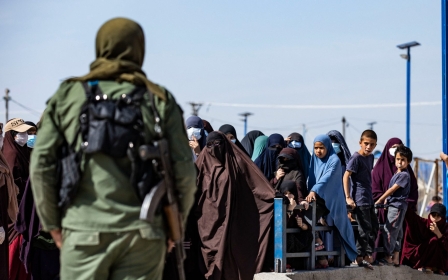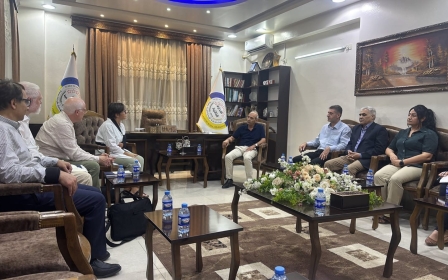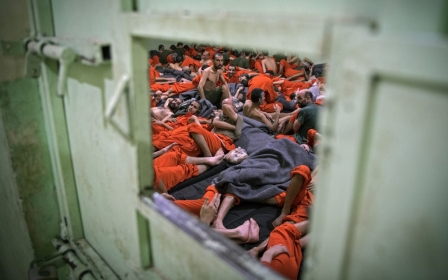Jack Letts, still detained in Syria, speaks to Canadian TV from Raqqa prison
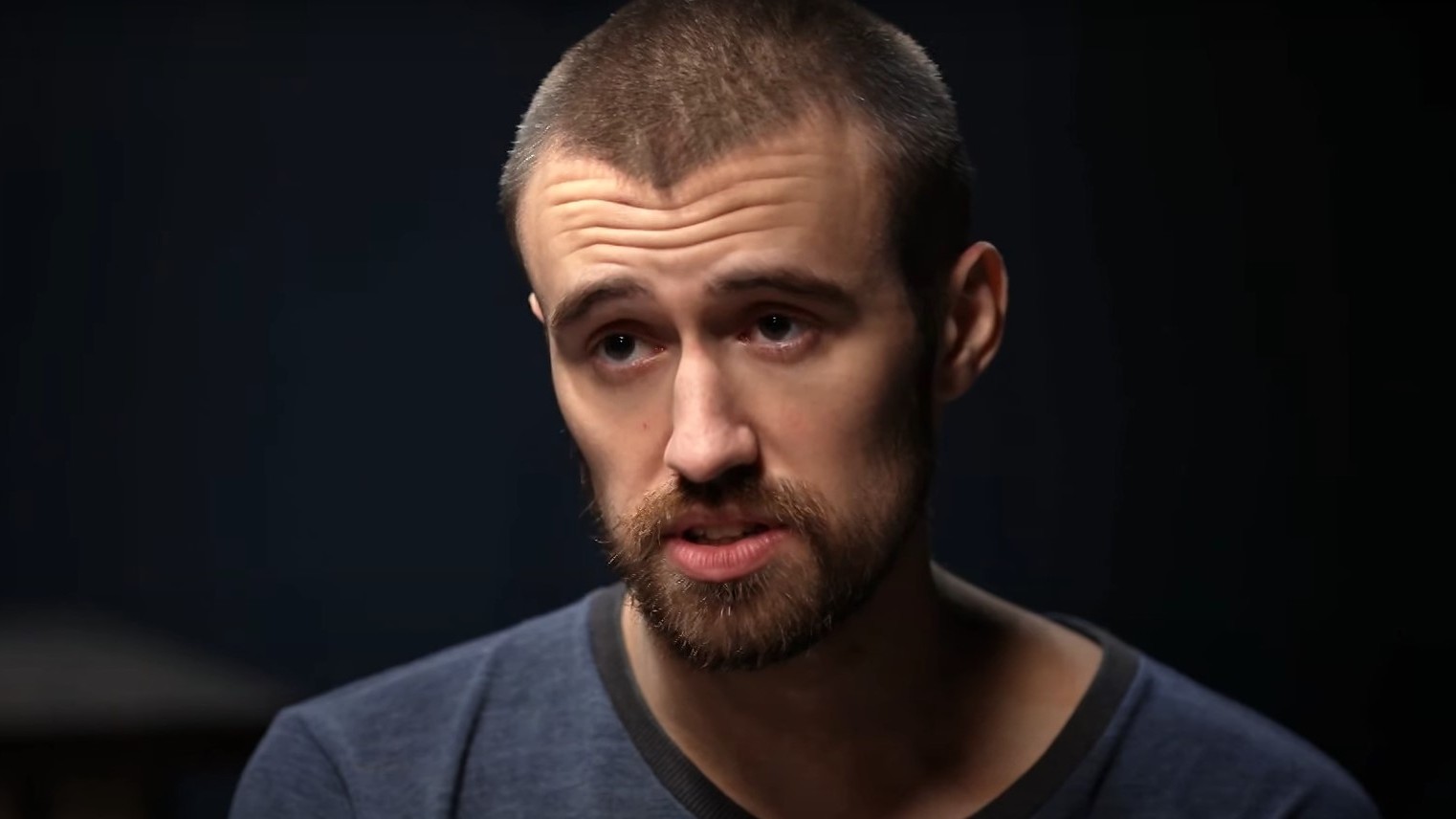
Jack Letts, a Canadian man originally from the UK detained for seven and a half years among suspected Islamic State members in northeastern Syria, has been found by a television crew in a prison near Raqqa.
The 29-year-old’s interview with CTV News’ W5 programme, which was broadcast on Saturday, marks the first time Letts has appeared on camera or been allowed to speak to the media since 2019.
Sally Lane, Letts' mother and a prominent campaigner calling for the Canadian government to repatriate all of its own citizens held in Syrian camps and prisons, told Middle East Eye there appeared to have been a marked deterioration in his condition since then.
"I was shocked at Jack’s condition, and how distressed and clearly traumatised he is," said Lane.
"I am so angry at the Canadian and British governments that they think it’s okay to completely destroy him as a human being. Jack is going to die if they don’t repatriate him. They know this, and still they do nothing.
New MEE newsletter: Jerusalem Dispatch
Sign up to get the latest insights and analysis on Israel-Palestine, alongside Turkey Unpacked and other MEE newsletters
"The feeling of outrage and powerlessness in this situation is something I live with every single day."
Speaking to W5’s Avery Haines, Letts denied he had ever been an IS member but said there were things he was unable to say because he is still in prison.
He said he would have “no problem” being taken to Canada, even if it meant being jailed for 100 years.
“At least let me rot in a prison in Canada,” he said.
Letts is one of tens of thousands of people, many of them foreign nationals, detained by Kurdish-led forces in formerly IS-controlled Syrian territory and held in camps and prisons for years without charge.
Human rights monitors have criticised these detentions as arbitrary and unlawful. In April, Amnesty International reported that at least hundreds of people had died as a result of torture, mistreatment and inhumane conditions.
Letts has previously said he was subjected to torture in detention. Kurdish authorities say they operate in compliance with international human rights laws.
The interview comes just weeks after a Canadian mother of six children, who had also been denied repatriation, died in Turkey after escaping from a camp in northeastern Syria.
Canada is among a number of western countries, also including the UK, that have resisted repatriating many of their nationals despite being urged to do so by Kurdish authorities, human rights and humanitarian groups, and senior US officials.
In October, US Secretary of State Antony Blinken said repatriation was “the only durable solution to the humanitarian and security crisis in northeastern Syria”, and Washington stood ready to provide logistical and diplomatic support to facilitate repatriations.
Ilham Ahmed, a senior Kurdish regional official, told W5: “Canada has not responded to our request to take back our people, and we are unaware of the reasons for this delay.”
A spokesperson for Global Affairs Canada told MEE: "Canadian consular officials remain actively engaged with Syrian Kurdish authorities and international organisations operating in the region, as well as civil society groups for information on and assistance to Canadian citizens in custody."
The spokesperson said that GA Canada did not comment on specific cases.
"Global Affairs Canada continues to evaluate the provision of extraordinary assistance, including repatriation to Canada, on a case-by-case basis."
Last year, Letts, then held in a different prison, was visited by a Canadian civil society delegation as part of a campaign to locate Canadian detainees and pressure the government in Ottawa to repatriate its citizens. But members of the delegation were not permitted to take photos or record video.
However, the Supreme Court of Canada in early November rejected an application filed on behalf of Letts and other male detainees, seeking an appeal against a judgment that ruled the government had no obligation to repatriate men detained in Syria.
Canada repatriated a number of women and children last year after their families launched legal action against the government.
This came after a federal court judgment in January 2023 ordered the government to repatriate Letts and three other men held in prisons.
But that judgment was later overturned in the court of appeal, which ruled that Canadian citizens did not have a “golden ticket… to force their government to take steps - even dangerous, risky steps - so they can escape the consequences of their actions”.
Blindfolded and handcuffed
Writing about how the W5 team found Letts, Haines said they had located him after a days-long search that led them to an unmarked prison in an industrial compound on the outskirts of Raqqa.
She said he had been led “blindfolded and handcuffed” into a basement “soundproof interrogation room” by masked guards and appeared to have had “little choice” about being interviewed.
Lane noted that Letts was not wearing any shoes.
She said: "One of the most upsetting parts was when he wasn’t able to explain why he has no shoes. Why does he have no shoes? Why is he forbidden to speak about the conditions?"
Letts, who is originally from Oxford, was last interviewed in detention by the BBC in 2019.
He was stripped of his British citizenship that same year, like many other British nationals who travelled to Syria during the country’s civil war.
Asked by Haines if he had been a member of IS, Letts replied: “Was I an ISIS member? No. A lot of things I said a long time ago because I was scared.
“I can’t say everything because I am still in prison.”
Letts, who converted to Islam as a teenager, travelled to IS-controlled territory in 2014 at the age of 18 during the height of Syria’s civil war.
He said that “naivete had played its role” in his decision to go to Syria, saying he had been motivated by watching “videos of people being blown to pieces” and a desire to help people.
“I spoke to people who gave me the impression that ISIS wasn’t what people said it was… As soon as I got there, I realised they weren’t what I thought."
Letts said he had become an enemy of the group. He had been imprisoned three times and told he would be killed.
“Without exaggerating, more than 20 of my close friends were killed by ISIS," he said.
Letts’ account of his time in Syria appears to be consistent with messages seen by Middle East Eye that he sent to his parents in late 2015, in which he described being “terrified” and desperate to flee Syria.
According to his parents, he spent much of his time in Syria in hiding before escaping IS-held territory and being detained by Kurdish forces in mid-2017.
Lane said: "He’s never been able to talk about why he went to Syria and how he believed he was helping the people of Syria, and how he rejected IS very soon after he got there. This is the first time in nearly eight years he’s been able to talk about this publicly."
Letts told W5 that after so many years in detention, he no longer gave any thought to what would happen in the future.
“It’s like being in a desert. Every time you come to a dune, there is another dune after it. So I stopped thinking,” he said.
Middle East Eye delivers independent and unrivalled coverage and analysis of the Middle East, North Africa and beyond. To learn more about republishing this content and the associated fees, please fill out this form. More about MEE can be found here.


